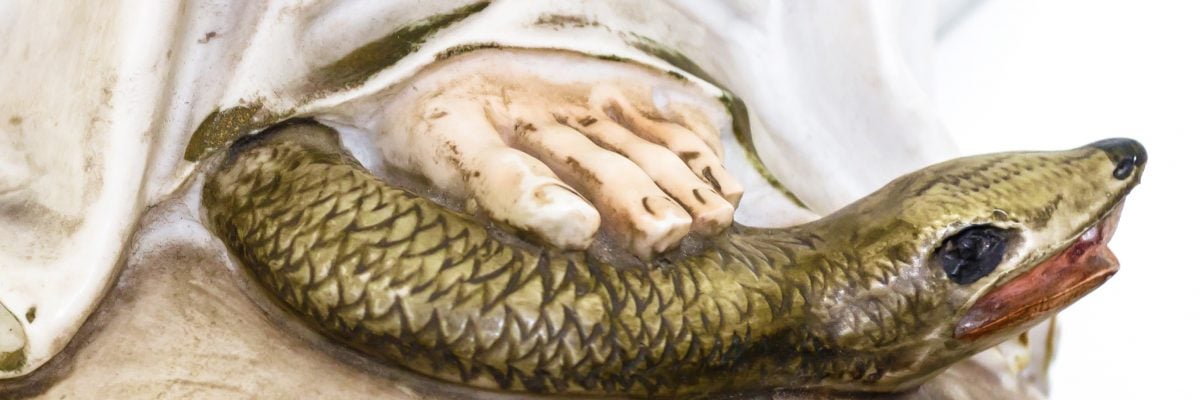
The first prophecy of redemption through Jesus Christ comes at the moment of the Fall, when the Lord says to the serpent, Satan, “I will put enmity between you and the woman, and between your seed and her seed; he shall bruise your head, and you shall bruise his heel” (Gen. 3:15).
Why is the Messiah presented as the seed of the woman? In the ancient world, the man was the one understood as providing the “seed” in the sexual act (Gen. 38:9, Lev. 15:17, etc.), and this was the typical way that the Israelites traced ancestry. So why is there no mention of Adam, or of any human father, in this passage?
Because, as St. Irenaeus noticed back in A.D. 180, the verse is about “he who should be born of a woman, [namely] from the Virgin, after the likeness of Adam.” The Messiah would be a true son of Adam, yet without a human father providing “seed,” due to the virgin birth. But recognizing this as a passage about Jesus and about the virgin birth means that “the woman” depicted in Genesis 3:15 is the Virgin Mary.
This sets the stage for the spiritual battle between the serpent (Satan) and the woman (Mary), which we find again in the book of Revelation. There we see a great sign in heaven, “a woman clothed with the sun, with the moon under her feet, and on her head a crown of twelve stars” who gives birth to Jesus Christ, and who is opposed by “the great dragon [. . .] that ancient serpent, who is called the devil and Satan” (Rev. 12:1, 5, 9).
In calling Satan “that ancient serpent,” John is intentionally calling us back to Genesis 3 so that we’ll make this connection. When the devil is unable to seduce the mother of Jesus, we’re told that “the dragon was angry with the woman, and went off to make war on the rest of her offspring, on those who keep the commandments of God and bear testimony to Jesus” (Rev. 12:17). In other words, the devil isn’t just preying upon Christians because he hates Jesus, but because (we’re specifically told) he hates the woman who gave birth to Jesus.
So this raises the question: who’s more powerful, the Virgin Mary in heaven or the devil in hell?
Strangely, some Protestants seem to believe it’s Satan. Of course, this is rarely something that Protestant Christians consciously or explicitly profess, but consider some of the objections to Catholics praying to Mary. We’re told, for example, that Mary can’t hear our prayers because she’s a finite creature, and so she can’t hear everyone’s prayers at once, and she can’t understand the different prayers uttered in different languages. Michael Hobart Seymour (1800-1874), an anti-Catholic polemicist, put the objection neatly:
It seems difficult to understand how she or any saint in heaven can know the wishes, the thoughts, the devotion, the prayers of the millions, who are praying to them in so many different parts of the world at the same time. If she or they were omnipresent—if omnipresent as the Godhead, all would be easy to conceive, all would be intelligible; but as they are no more than finite creatures in heaven, this cannot be.
We find the same argument used today. In A Woman Rides the Beast, for example, Dave Hunt objected to the line, “Turn then, most gracious advocate, thine eyes of mercy toward us” from the Salve Regina on the grounds that “Mary would have to be omnipotent, omniscient, and omnipresent (qualities of God alone) in order to extend mercy to all mankind.”
So Mary and the saints, being “finite creatures in heaven,” are too limited and weak to hear your prayers. Satan, on the other hand . . .
Well, just consider the scriptural data. St. Peter enjoins us to “Be sober, be watchful. Your adversary the devil prowls around like a roaring lion, seeking someone to devour” (1 Pet. 5:8). And another of the titles John uses for Satan, in Revelation 12, is “the deceiver of the whole world” (Rev. 12:9). This global reach of Satan is individual and intimate, at the level of the heart and soul.
We see this repeatedly. ”Satan stood up against Israel, and incited David to number Israel,” we read in 1 Chronicles 21:1. At the Last Supper, “Satan entered into Judas called Iscariot, who was of the number of the twelve” (Luke 22:3). And Peter asks Ananias, “Why has Satan filled your heart to lie to the Holy Spirit and to keep back part of the proceeds of the land?” (Acts 5:3). So although Protestants might think that Mary and the saints are too limited and creaturely to interact with each of us individually and everywhere, they can’t deny that the devil does this.
It’s understandable why Protestants are confused about how Mary can hear prayer (or how the devil can, for that matter!). But if you say that Mary can’t hear prayers, or understand modern languages, or interact with us here on Earth, but that Satan can do all of those things, then just realize that you’re saying that Mary, in the presence of God in heaven, is still weaker than Satan. To press it further, to say (as Seymour and Hunt did) that Mary can’t do those things because it would make her equal to God, you’re suggesting that Satan is equal to God.
Obviously, the problem here is not that Protestants have carefully concluded that Satan is greater than the Virgin Mary. That would be absurd. The problem is rather that, like so many of us, they have too limited an understanding of heavenly glory. This is understandable, given that “no eye has seen, nor ear heard, nor the heart of man conceived, what God has prepared for those who love him” (1 Cor. 2:9). Heaven is unimaginably glorious, but it’s also simply unimaginable, which means our conception of heaven tends to be much too small.
If you really want to understand heaven better, consider this: in the presence of the revealing angel, St. John twice fell down to worship him (Rev. 19:10; 22:9). Despite being arguably the greatest apostle, John struggled to understand how this angel wasn’t divine—that’s how glorious the angels are. And the saints are raised above even that! Paul asks, almost as an aside, “Do you not know that we are to judge angels?” (1 Cor. 6:3).
John puts this beautifully: “Beloved, we are God’s children now; it does not yet appear what we shall be, but we know that when he appears we shall be like him, for we shall see him as he is” (1 John 3:2). So you’re already a son or daughter of God; this a spiritual reality too big for us to fully grasp. What you’re going to be is unimaginable, but John promises that we shall be like Jesus. Peter says the same thing when he reminds us that Jesus “has granted to us his precious and very great promises, that through these you may escape from the corruption that is in the world because of passion, and become partakers of the divine nature” (2 Pet.1:4).
C.S. Lewis is not exaggerating when he describes Christians as “a society of possible gods and goddesses” of whom “the dullest and most uninteresting person you talk to may one day be a creature which, if you saw it now, you would be strongly tempted to worship.” That’s how Scripture presents Mary and the saints in glory.
In the garden, Satan told Eve that if she ate the forbidden fruit, she would “be like God” (Gen. 3:5). That was a lie, but Jesus makes it a promise and delivers on it. He actually makes us like him, actually makes us partakers of his divine nature, just as he freely chose to partake of our human nature by becoming a son of Adam and the son of Mary. This is why Mary is more powerful than Satan: not because she is more powerful by nature, but because her son Jesus, “who for a little while was made lower than the angels” by becoming incarnate in her womb (Heb. 2:7), freely chooses to share his divine glory with Mary and all the saints.
So if you’re thinking that Mary and the saints are too weak and limited to hear our prayers, you may need a greater appreciation for the “precious and very great promises” that God has ready for those who love him.



